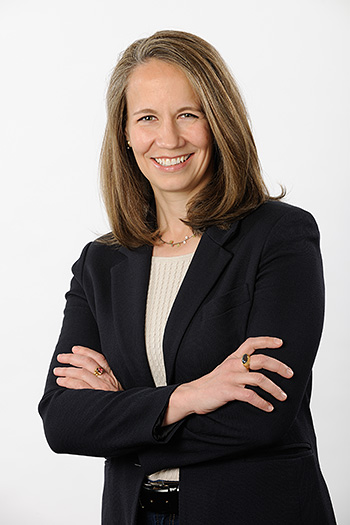Editing genes to target disease: Katrine Bosley's work targets poorly served diseases, patients

Katrine Bosley '90. Image: Provided.
Although Katrine Bosley '90 doesn't get a lot of time to talk to patients as CEO of Editas Medicine, she relishes the opportunity.
"You only have to talk to one patient with one disease that you're working on to know why you go to work every day," says Bosley, whose company is working to translate genome editing technology into new drugs and treatments for poorly treated diseases and patients.
Bosley, who as a College Scholar in the College of Arts and Sciences studied biology and genetics, along with business and technology, has been working for biotech companies for the past 25 years. As CEO of Avila Therapeutics from 2009-12, she helped grow the company from 25 people to 65 and managed an acquisition by Celgene for $925 million. Before that, she was vice president for business development at Adnexus Therapeutics and held positions at the global biotechnology company Biogen Idec. She joined Editas in June.
"What I've done over the years is understand how to bring together science, capital and teams to turn innovative science into innovative products," she says.
But that process can often take 15-20 years, she explains: "It takes hundreds of people and hundreds of millions of dollars."
"I've been in the room where we 'open the envelope' on the data that's the big test on whether a medicine will work," she says. "That is without question the most exciting moment in a career."
Editas, established in 2013, has a staff of 20 today. The company's technology involves a molecular system that can repair or delete dysfunctional genes, which are the cause of many diseases.
Having worked for established companies and smaller startups, Bosley says she enjoys the entrepreneurial culture of young firms.
"Every once in awhile I step back and remember that it's kind of scary being in this environment where you do not have a clear path ahead and nobody's done it before," she says. "But it feels normal to me."
She says her College Scholar experience supported her natural inclination to mesh her interests in multiple fields, a characteristic that has helped her as a leader.
"I was going to make 'Nova' films," she recalls of her initial College Scholar idea to combine science and filmmaking. "But I found out that I was really bad at film, and it didn't appeal to me as much as I thought."
So she took classes in five different colleges along with genetics and organic chemistry courses. Her thesis focused on government regulation of recombinant DNA technology.
After college she moved to Boston with some Cornell friends, met Cornellians through the Cornell Club there and networked with them to learn about the biotech community.
"I completely love what I do," she says. "In each of my classes at Cornell, I would explore how that subject matter intersected with science. I'm still quite fascinated by that intersection."
Kathy Hovis is a writer for the College of Arts and Sciences.